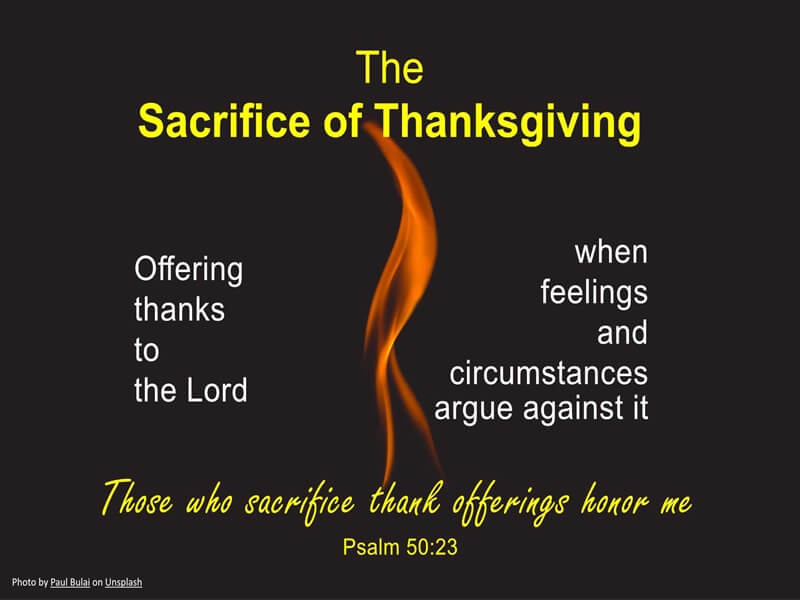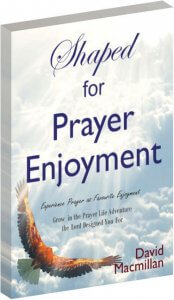Saying thanks to the Lord for his good gifts is right, but is only one part of the spirit of thankfulness. The larger part is the celebration that HE IS GOOD. This level of thanks doesn’t always start with a happy dance, as when something good has happened. It might be more like a groan of gratitude in a time when the ‘something good’ seems hidden. But that groan can be a sacrifice of thanks that honours the Lord.
Goodness passing in front of us
The Lord loves it when we voice thanks for all he gives and does for us. But the sacrifice of thanks is bigger than the gratitude we feel for a recent gift, for an answered prayer or even for the sum of all good things we can recall. The huge core of thanksgiving (now and forever) is our response to the kind of God he is. He does good, because HE IS GOOD.
Every kind gift from the Lord, every answered prayer and every good thing he does for us points us to his Glory – that HE IS GOOD. They are reflections of his goodness passing in front of us all the time (Ex 33:19).

The Sacrifice of Thanks
Not always easy
It’s not difficult to give thanks when we are on the receiving end of a gift, especially if it’s his answer to what we have been asking for. However, when thanks is not tied to a gift or to an answer received, but is fastened to the unchanging truth that HE IS GOOD, it might need to be a sacrifice of thanks, because it’s not always an easy offering to make.
It’s often an inconvenient, difficult offering, made against protesting emotions. Perhaps it’s because the answer we were hoping for hadn’t arrived and the circumstance is spiraling downwards. Or, perhaps it’s the unexpected news that turned a happy day into a dark, stormy crisis. In those times when it seems that ‘good gifts’ have by-passed us, our mood for thanks celebration drops.
A valued sacrifice
Yet, the fire on the altar isn’t dead, and the Spirit’s witness of Glory isn’t silent. He reminds us again: HE IS GOOD. The heavy heart can’t manage a shout of happiness, but can offer a groan of thanks. It’s the heart’s agreement with the Spirit that his goodness is present, even when we see no sign of his good gifts. The Lord values the offering, because it’s been made while feelings and circumstances argue against it. It started as a groan of gratitude, but WILL become more, and feelings WILL join the celebration!
Thanks shouldn’t be held back until after the Lord answers, but be given beforehand. It’s given as a sacrifice while the trouble is still present. The reason is: the sacrifice of thanks honors the Lord (Psalm 50:14-15, 23).
Phil 4:4-7 echoes that truth. Thanks should accompany the asking, not wait for the answers. In other words, while asking for God’s help in a need or crisis, give thanks before the help comes. That offering is a sacrifice of thanks, a celebration that HE IS GOOD…even before his answer arrives.
Anchor to Psalm 50:23
Those who sacrifice thank offerings honor me, and to the blameless I will show my salvation
- Begin by telling the Lord of your great longing in life: to honor him, to admire and draw attention to his Glory
- What salvation are you asking the Lord for? What kind of rescue from the Lord will make the difference to the individual or situation you are praying for, and will bring him honor?
- The Lord will have honor in the answer, but also throughout your asking. Admire him, that HE IS GOOD, and work your sacrifice of thanks into your asking. Each time you ask, add more thanks.
- Read Phil 4:7. Burden or concern for the rescue to happen can co-exist with RESTING in the Lord’s goodness, but anxiety and fear cannot. The sacrifice of thanks will nurture restfulness, and the Lord’s PEACE will be the inner witness of a heart and mind at rest in him. Is this true of your experience as you continually soak your prayer concern in thanksgiving?




